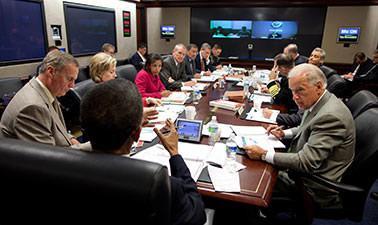
How can Iran be stopped from getting a nuclear bomb—negotiations, sanctions, or military action? As a participant in this course, you will advise the president in deciding whether, and how, the U.S. should act. Once you’ve made your assessment, you will move on to wrestle with other scenarios preoccupying policy makers. Between the Assad regime and ISIS, civilians in Syria and Iraq face unimaginable atrocities. Should the U.S. intervene? China’s rise is rattling capitalist economies and a half-century of Pacific peace. What counterbalancing actions should Washington take? Leaks are a fact of life — but why do they happen? Who gets them, and why? Should journalists publish or withhold them? Does legal accountability lie with the leaker—or the journalist?
This seven-week course casts you as advisors on the hardest decisions any president has to make. We will go behind the veil to see the dynamic between the press and the U.S. government, to explore these dilemmas. We will also have to contend with the reality that government secrets rarely stay that way. Participants will learn to navigate the political landscape of an era in which private remarks become viral tweets, and mistakes by intelligence agencies become front-page stories.
Weekly assignments require strategic thinking: Analyzing dynamics of challenges and developing strategies for addressing them. Students will learn to summarize their analyses in a succinct “Strategic Options Memo,” combining careful analysis and strategic imagination with the necessity to communicate to major constituencies in order to sustain public support. They will also examine how policymaking is affected by constant, public analysis of government deliberations.
What you'll learn
- Issues in international affairs from a “policy perspective”
- How to think strategically about feasible interventions
- Effective communication of issue analysis in policy memorandum format
- How to operate within current national security policymaking processes surrounded by an intrusive, inquiring press
- An appreciation for the complexities of communicating national security policies to multiple audiences
